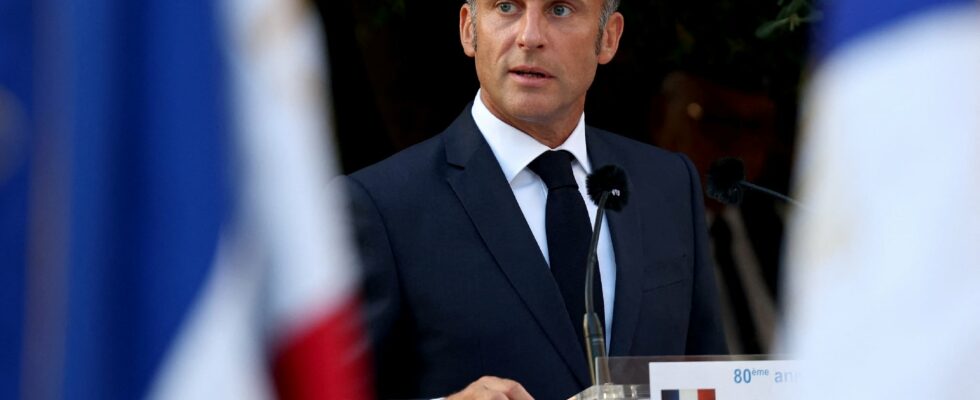This is the article that caused the scandal. The article that triggered all the controversy in this Olympic summer. It is three sentences long, not a single comma of which has been changed since 1958. “The President of the Republic appoints the Prime Minister,” states this famous text. General de Gaulle, when the Constitution of the Fifth Republic was drafted, would have willingly added a power of revocation, but he had to bow and was in a very bad mood.
“The president puts an end [aux] functions [du Premier ministre] on the presentation by the latter of the resignation of the government”, continues article 8 of our fundamental law. A real break, as noted by Michel Verpeaux, professor emeritus of the University of Paris Panthéon-Sorbonne, in the journal of Lawyers Club : “The Constitution of the Fourth Republic was very different, at least until the revision of December 7, 1954: it was provided that ‘the President of the Council and the ministers can only be appointed after the President of the Council has been invested with the confidence of the Assembly by public vote and by an absolute majority of the deputies, except in cases of force majeure preventing the meeting of the National Assembly (article 45, paragraph 3)'”.
Article 8 consecrates the king’s choice in all its splendor: Emmanuel Macron, like all of his predecessors of the Fifth Republic, has since 2017 used his complete freedom to choose to send to Matignon whoever he wanted. Good? Listening to the criticisms that have so quickly emerged from the Elysée on Gabriel Attal, would he repeat the same decision?
Our Basic Law: Summer Bestseller
Since the dissolution and the legislative elections which he had such difficulty acknowledging – half-heartedly, belatedly – that he had lost, the head of state, accustomed to exercising his constitutional prerogatives in their fullness, has clung to the famous article. In 1986, after losing legislative elections, François Mitterrand publicly displayed his freedom to choose, but since the new majority of the time (weak, certainly, but absolute) had locked the system in order to fall in behind Jacques Chirac, the latter’s nomination was imposed on Mitterrand. This was the case in 1993 and 1997, always with absolute majorities.
To “respect” the Constitution, hammers the NFP, Lucie Castets must go to Matignon. Article 8? Article 68, draw Jean-Luc Mélenchon, Mathilde Panot and Manuel Bompard in The Tribune Sundaythus brandishing the threat of impeaching the president (with no chance of success, since the Senate would not validate it). Our fundamental law is definitely the best-seller of the summer.
Because this time, everything is different, and even everything is unprecedented. “Today, there are three minorities,” replies the Elysée to explain that it is necessary to change logic, abandon “the majority fact in which the political class is molded” and “reason in terms of barycenter”. A way for Emmanuel Macron to assimilate Lucie Castets’ forcing to agit-prop, to regain control despite the election result and to make the “perfume of cohabitation” – an expression widely disseminated in recent weeks by the presidency of the Republic – a decoy. By choosing to receive the political forces himself on August 23, he shows his determination to remain at the center of the game. Since he has always advocated surpassing, he cannot imagine that a coalition could be built if he himself had not been the facilitator.
Another scenario was possible. In July, François Bayrou, with others, tried to convince Emmanuel Macron to adopt a different attitude: to appoint a personality (himself, for example!), who would then try to form a majority. If successful, he would then be appointed to Matignon. The centrist readily quotes General de Gaulle’s speech in Bayeux: “The head of state is responsible for reconciling the general interest in the choice of men with the direction that emerges from Parliament.” He insists on the advantage for the president to remain above the fray: that of not exposing himself personally in the event of failure.
An unprecedented landscape
In some countries that have adopted the proportional voting system, this is the very definition of the Prime Minister’s job: to make compromises, to seek what does not exist spontaneously, namely a parliamentary majority. In France, there is a precedent. In 1986, François Mitterrand called Jacques Chirac on March 18 to conduct an overview, then the latter consulted the victorious right-wing parties before returning to see the head of state and being appointed Prime Minister two days later.
In an unprecedented landscape, Emmanuel Macron is working to provide a political response when the Constitution does not allow for a legal response. He is not the first. Faced with the first cohabitation of the Fifth Republic, Mitterrand, again, had been in the interpretation of his own power. He created law. He refuses to sign the ordinance on privatizations: no one knows today if he could have done so! And he was not prosecuted for forfeiture…
In 2024, Emmanuel Macron is trying to take advantage of a paradoxical situation: since the deputies arrived at the Assembly following a dissolution and not in the wake of a presidential election, they have strong legitimacy. But they are more fragmented than ever before… “Parliament is both central and weak,” notes one of his close associates. “Those who talk about Parliament at length in their sentences actually want chaos.” And the president has always lacked the strength needed to know how to move into the background, especially since he has never had the eyes of Chimène for parliamentarians.
Here we are at the heart of the Gordian knot: Emmanuel Macron could almost do whatever he wants… as long as he is not the one doing it. How can we get out of this impasse? Far from being the “clarification” desired by the president, the dissolution, decided by a single man and without the consultations required by the Constitution, is now a spiral.
.
